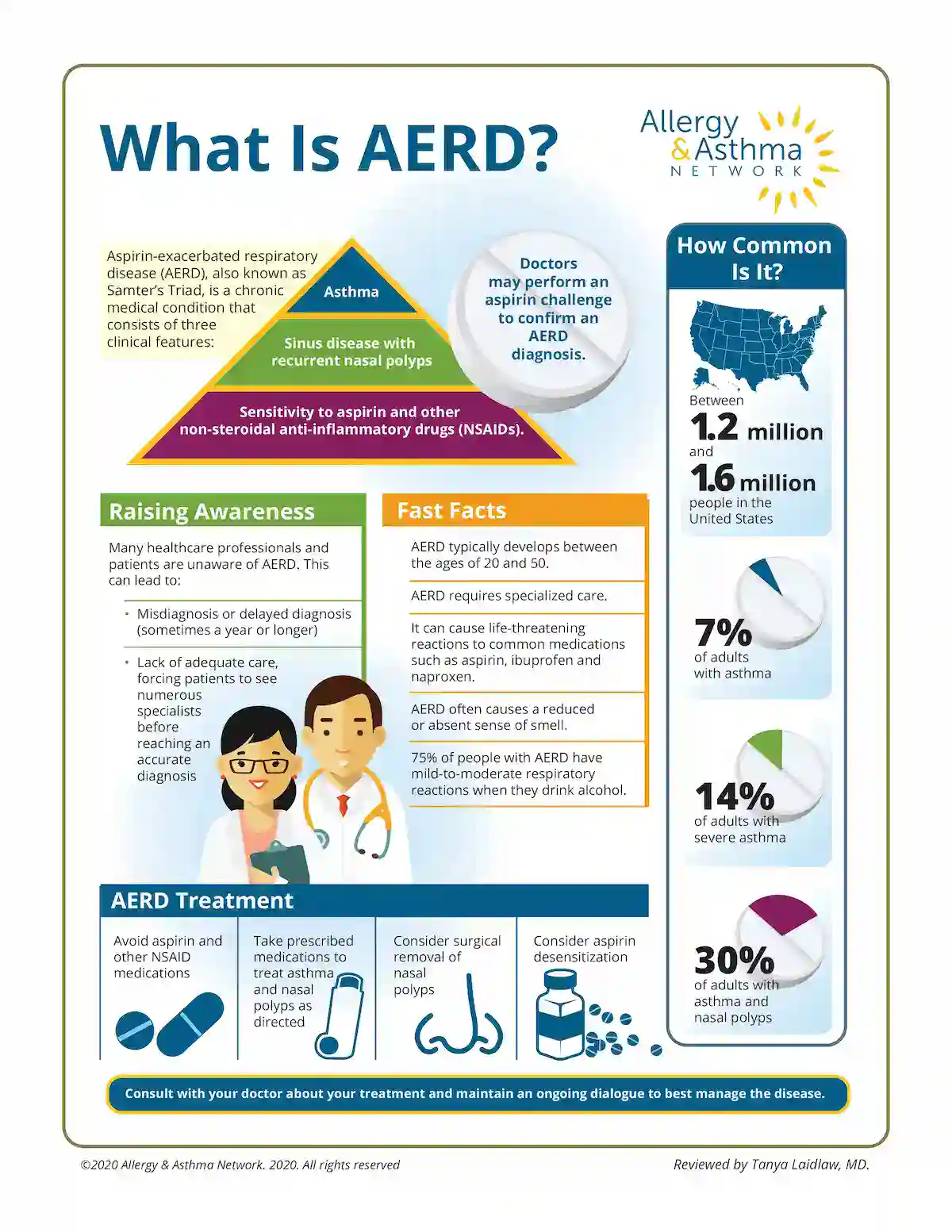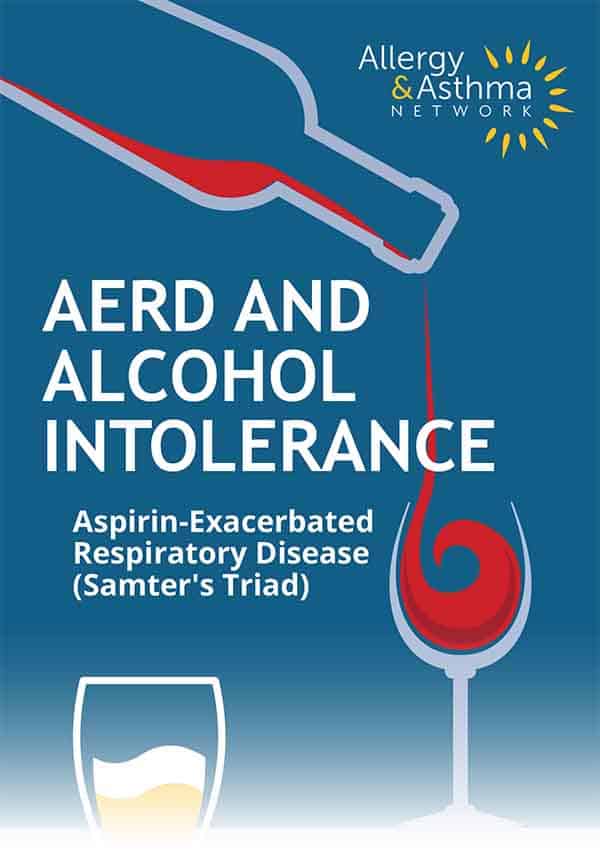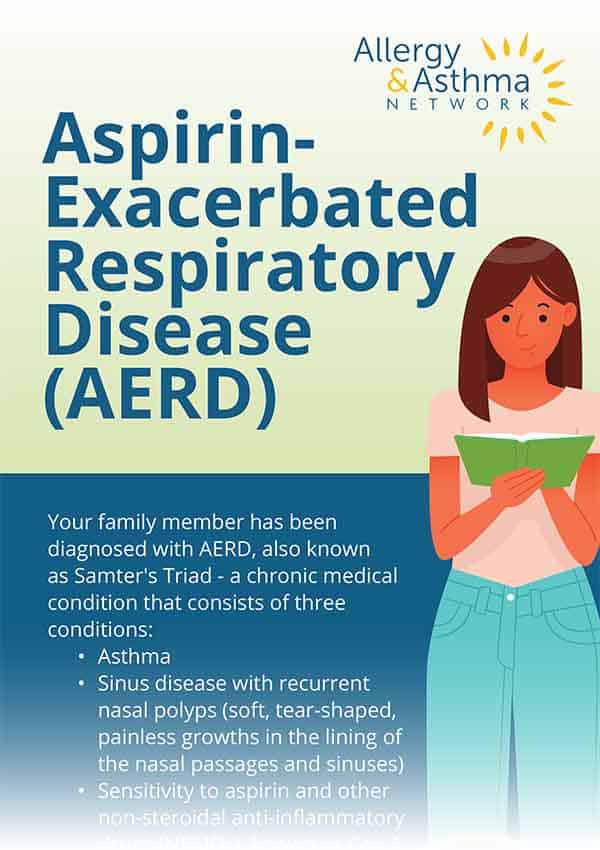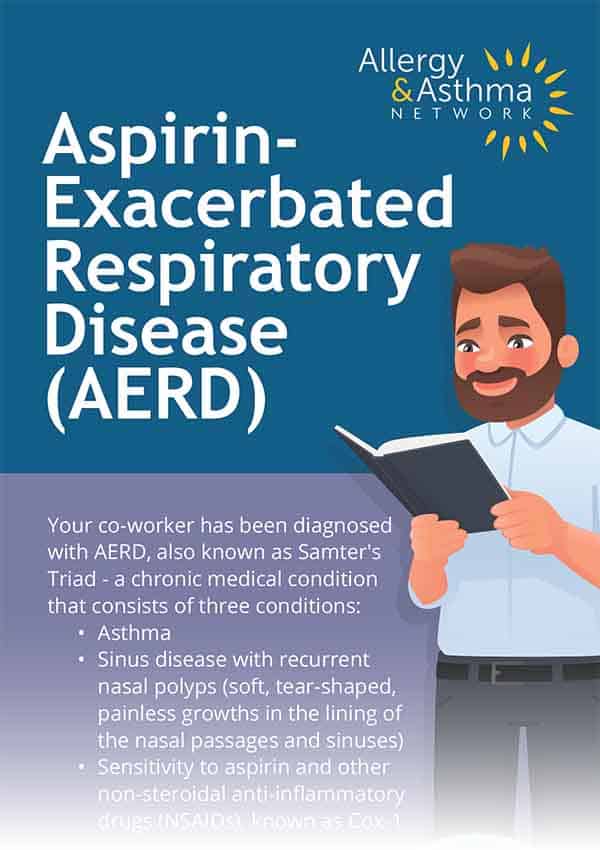AERD: Aspirin Exacerbated Respiratory Disease
Aspirin-exacerbated respiratory disease (AERD) is also known as NSAID-exacerbated respiratory disease (NSAID-ERD) and Samter’s Triad. It is a chronic disease that consists of three conditions:
- asthma
- recurrent nasal polyps (soft, teardrop-shaped, painless growths in the lining of the nasal passages and sinuses)
- sensitivity to aspirin and other non-steroidal anti-inflammatory drugs (NSAID), known as COX-1 inhibitors
Many people with AERD also experience chronic sinus infections and a loss of sense of smell. AERD develops in adulthood, usually between the ages of 20 and 50. There is no clearly recognized trigger that causes AERD; it’s not believed to be an inherited disorder.
What are the symptoms of AERD?
People with AERD usually have asthma, nasal congestion and recurrent nasal polyps. Symptoms often do not respond sufficiently to conventional treatments.
Symptoms include:
- Nasal congestion
- Itchy, watery, red eyes
- Coughing, wheezing, chest tightness
- Headache or sinus pressure
- Nausea or abdominal pain
- Hives or a rash
- Alcohol intolerance
When someone with AERD takes aspirin or an NSAID, the severity of symptoms will vary widely from person to person.
How is AERD diagnosed?
There is not a specific test for AERD. The diagnosis is a clinical one – if a patient develops all three of the conditions – asthma, nasal polyps and aspirin sensitivity – then that’s usually enough for a doctor to diagnose AERD.
A characteristic feature of AERD is that people develop respiratory reactions to aspirin and other NSAIDS. These reactions classically involve both upper respiratory symptoms (increased nasal congestion, frontal headache or sinus pain, and sneezing) as well as lower respiratory symptoms (cough, wheezing, chest tightness), but they can also induce skin flushing, rash, abdominal pain and occasionally vomiting. Doctors may perform an aspirin challenge to confirm the diagnosis.
People with AERD have high numbers of eosinophils, a type of immune cell that is involved in inflammation, in their nasal polyps. They often have elevated levels of eosinophils in their blood. Though the presence of an elevated eosinophil level is not required as part of the diagnosis, it can be a helpful additional insight.
What is the treatment for AERD?
First, patients with AERD who have not been desenstized to aspirin should avoid aspirin and all other NSAIDs to prevent reactions. Even with the complete avoidance of NSAIDs, people will continue to have symptoms of asthma, nasal congestion and recurrent polyps. Acetaminophen is usually safely tolerated at low doses (up to 500mg at a time or below 1000 mg).
Most people with AERD will need to use daily medications to control their symptoms: inhaled corticosteroids for asthma, intranasal steroid sprays or steroid sinus rinses can help to control the nasal symptoms, and nasal polyps can also be treated with steroids injected directly into the polyps. For patients with severe asthma, new injectable biologic medications may be helpful.
Several non-steroid medications are also available, specifically medications that inhibit the production of leukotrienes (zileuton) or block the function of leukotrienes (Montelukast and Zafirlukast) and can help to treat some of the symptoms.
Patients can also undergo corticosteroid injections to treat nasal polyps. Despite intensive medical therapy, the need for surgical removal of nasal polyps in AERD is very common, though unfortunately the rate of recurrence of nasal polyps after surgery is high.
Is aspirin desensitization a treatment for AERD?
Aspirin desensitization in order to initiate daily high-dose aspirin therapy can also be used as a steroid-sparing treatment in some patients. In people with AERD, an aspirin desensitization procedure can be performed by administering gradually increasing doses of aspirin in a hospital or clinic that specializes in such treatment. The goal of aspirin desensitization is to have the person begin long-term daily aspirin therapy, which in many people can decrease the regrowth of nasal polyps and reduce the need for corticosteroid medications.
An added benefit of desensitization is that it allows patients to tolerate aspirin and NSAIDs again.
Who has AERD?
- Between 1.2 million to 1.6 million people in the United States.
- 7% of adults with asthma
- 14% of adults with severe asthma
- 30% of adults with asthma and nasal polyps
What medications do you avoid with AERD?
If you have AERD, avoid COX-1 inhibitor NSAIDs including:
- Aspirin or salicylate-containing medications
- Ibuprofen
- Naproxen
- Ketoprofen
- Ketorolac
- Diclofenac
What pain medication can patients with AERD use?
People with AERD can safely take the COX-2 inhibitor drug celecoxib as an anti-inflammatory or pain reliever.
What if a healthcare provider is concerned about your aspirin dosage?
Although AERD is not a rare condition, some health care providers may not be familiar with the long term aspirin therapy often prescribed. Some AERD specialists will provide their patients with a letter containing a brief description of AERD and its management with long-term aspirin therapy. This letter can then be taken with the patient when seeking healthcare with other providers.

















